Stop the freelance rip-off
All freelances in the UK should respond to government's consultation on late payments and poor payment practices. It's time for urgent change.
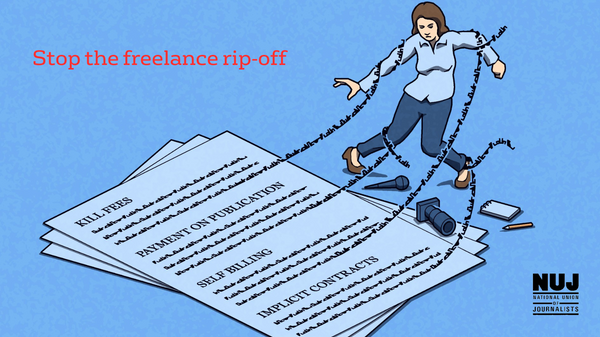
Freelances are treated abysmally by many news platforms – and it's getting worse. Kill fees, payment on publication, and unpublicised ‘implicit contracts’ allow powerful companies to treat their smallest suppliers like dirt.
But now, the UK government is running a public consultation with the intention of improving conditions for small businesses. This consultation, and the consideration of legislation that is likely to follow, are a unique opportunity for freelance journalists to act to improve our conditions.
On this page are links to articles about the consultation, template answers for questions posed by the government, and a sample letter to amend when writing to your MP. The more journalists who respond, the better the chance of favourable change.
Tim Dawson, NUJ freelance organiser, has written a piece on the realities facing freelances and why it is crucial action is taken now to support the campaign and urge change. Read it here.
Take action
Whether you are an NUJ member or not, if you have ever felt badly treated by a news platform, there are three things you need to do right now, to make a difference.
- Respond to the consultation before the deadline of 23 October 2025
- Write to your MP - amend the model letter and write directly to using our simple tool
- Encourage other freelance journalists to do the same
And, whether you are member or not, sign up for more campaign information. Email [email protected]
Not yet a member? The NUJ actively campaigns for improved pay and terms for freelances. Find out more about our calls, and about joining the union: nuj.org.uk/join
Social media
Copy the template text for social media and use the graphic across platforms to help raise awareness of the campaign:
Template text 1
The UK government is consulting on late payments and poor practices. This issue greatly impacts freelances. Support the NUJ's campaign to raise awareness by writing to your MP using their simple online tool. nuj.good.do/stopthefreelanceripoff/
Template text 2
Respond to the UK government's consultation on late payments and poor practices. The National Union of Journalists has responses to support your submission. This is an important opportunity for every freelance journalist. #StopTheFreelanceRipOff: nuj.org.uk/resource/stop-the-freelance-rip-off.html
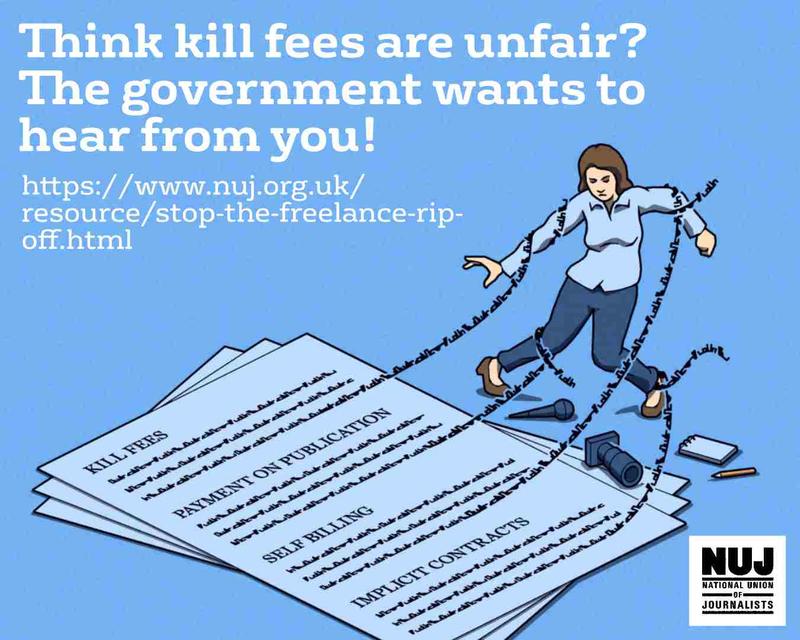
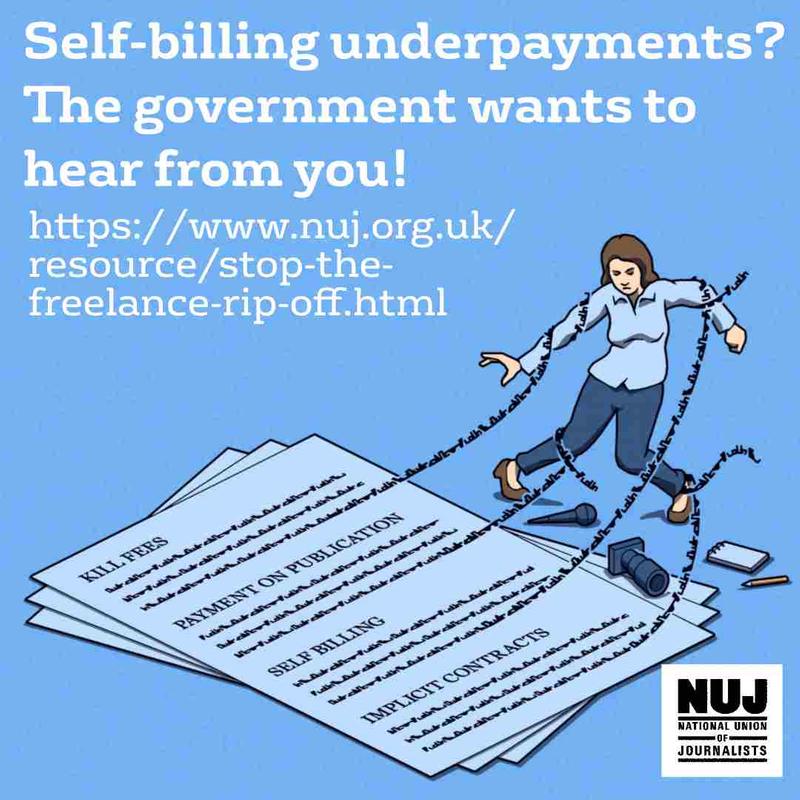
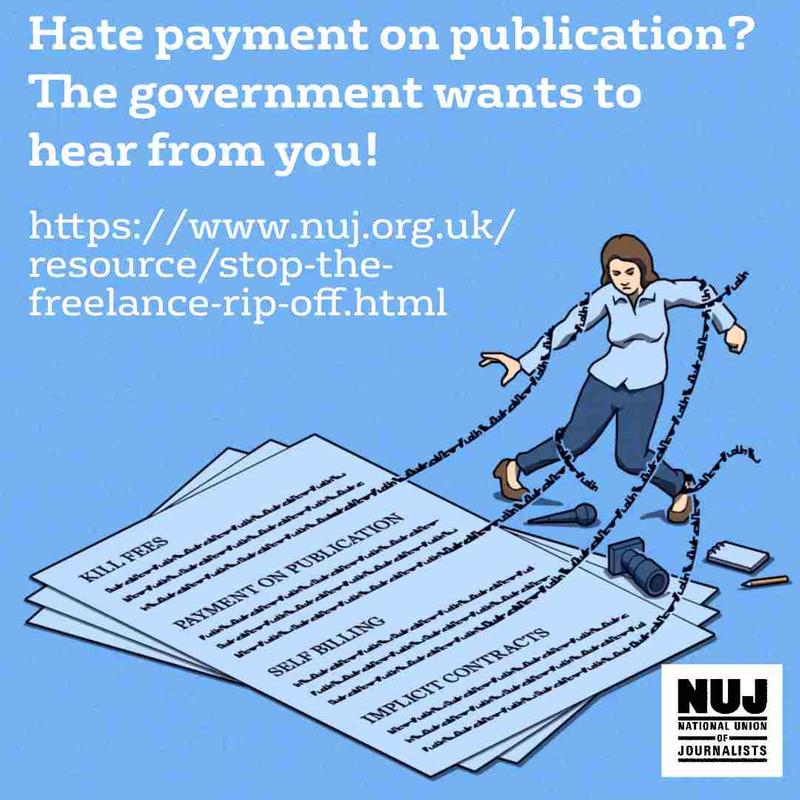
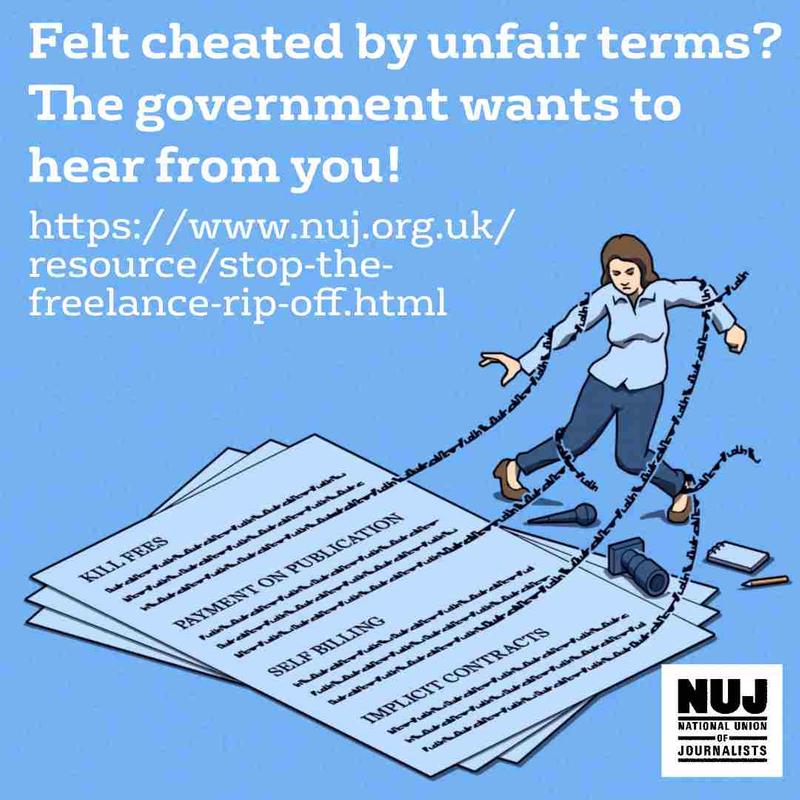
Not yet a member? Freelances, here are 10 reasons to join the NUJ
1 Working collectively – journalists face intense pressure from subjects, corporations, governments and even our own bosses. Working together is critical to defend our interests and fight for fair treatment of journalists. The NUJ spearheaded the creation of the National Committee for the Safety of Journalists, and meets regularly with government ministers, police chiefs, court officials, and security-industry representatives to ensure that we can work unimpeded.
2 Personal support – every day the NUJ’s freelance office chases late invoices, challenges copyright thefts, advises on contracts, and provides guidance to members. Dependable, professional support allows freelance journalists to concentrate on what they do best –finding and selling stories.
3 Defending free reporting – since its inception the NUJ has promoted legislation and fought test cases to support and extend the right to report. Without the NUJ, we would have no legal source protection, journalistic privilege under PACE (England and Wales), nor the right to trades union representation. Fresh challenges to these and other rights are constant.
4 Accreditation – the NUJ is the only organisation in the UK and Ireland that gives eligible members access to the UK, Irish and International Press Cards. Proof that you are a journalist can be the difference between getting the story and wasting your time.
5 Financial support when its most needed – the NUJ’s charity, NUJ extra, assists members in the most challenging situations, be it collapsing income after ill health, the consequences of domestic violence, or unexpected bereavement. NUJ extra offers members cash grants and practical help getting back on track.
6 Ethical journalism – journalists get a bad rap. The NUJ Code of Conduct and Ethics Council are demonstrable roots that bind our work to clear, public standards.
7 Continuing professional development – NUJ members have access to training that is relevant, up-to-date and affordable (often it’s free). Be it media law, broadcast skills, marketing your work, or deploying AI, the NUJ has a course for you.
8 Personal contacts – freelancing can be isolating. The NUJ provides connection through our branches, events and online networks. All are great opportunities to share ideas, seek information, and develop your networks.
9 Collective support for better rates – freelance rates have stagnated for years. The NUJ has pushed up freelance rates at The Guardian, The Financial Times, and the BBC. The more freelances who join the union, the better we will be able to maintain upward pressure on rates. The NUJ also produces vital tools such as The Rate For the Job, the Freelance Fees Guide, and the Freelance Fact Pack.
10 Support at critical moments – arrested on a demonstration or harassed by the unhappy subject of an article – NUJ support at critical moments often averts crisis in times of greatest need. The union operates 24-hour emergency legal support lines, and staff are always available to intervene on members’ behalf.
Resources
Template responses to government's consultation
Below are the questions asked in the UK government’s Department for Business & Trade’s consultation on late payments. If you follow the link below and ask to complete the consultation, you will be asked to respond to these questions, with ‘answer boxes’ in which you can fill in your answers.
Any UK citizen is entitled to respond to the consultation. The more freelance journalists who do, the better. Included here are some sample answers that you are welcome to use.
Your own answers, particularly if backed up with examples from your own experience will be all the more powerful. If you have any concerns or questions while responding to the survey, feel free to contact [email protected]
https://www.gov.uk/government/consultations/late-payments-tackling-poor-payment-practices
Name
2. Email (if you agree to be contacted about your responses)
3. Capacity (business, trade representative, other organisation, individual)
For most freelances this will be ‘sole trader’. If you are a partnership or limited company, explain than here.
4. If responding on behalf of a representative body please make it clear who the organisation represents and, where applicable, how the members’ views were assembled.
5. Size of business (if applicable)
For most freelances this will be ‘sole trader’.
6. Name of business / organisation / representative body
7. Region 8. Sector
News media
Q9a To what extent do you agree that Audit Committees, where companies have them, should provide commentary and make recommendations to company directors before data is submitted to Government and included in Directors reports?
[Strongly agree / somewhat agree / neither / somewhat disagree / strongly disagree]
Strongly agree – It would be useful for all directors to know how media companies treat their smallest suppliers. Where companies are publicly listed, it would also be helpful if such information were included in their statutory annual reports.
Q9b To what extent do you agree that the Small Business Commissioner should write to audit committees and company board, where companies have them, when undertaking payment performance reporting assurance and when investigating any other matter relating to a companies’ payment practices?
[Strongly agree / somewhat agree / neither / somewhat disagree / strongly disagree]
Strongly agree. Freelance journalists, as some of the smaller ‘suppliers’ to news platforms, almost always feel utterly powerless in their dealings with organisations that, in many cases, exercise significant control over their lives. Any kind of external scrutiny of the operation of business terms on freelance journalists would redress this balance, at least a little.
Q9c Are there any potential unintended consequences or considerations that could happen if this measure was introduced?
[Yes / No]
No, I can’t think of any.
Q9d Please explain the reasons for your answer to question 9c.
[Narrative description]
Q10a To what extent do you agree that limiting UK payment terms to 60 days at a maximum will be effective in addressing the stated problem of long payment times?
[Strongly agree / somewhat agree / neither / somewhat disagree / strongly disagree]
Somewhat agree.
Q10b Please explain the reasons for your answer to question 10a
[Narrative description]
The issue for many freelance journalists goes beyond ordinary payment intervals. Publications that ‘pay on publication’ often don’t pay for commissioned work until months after it is completed. Also, the operation of ‘kill fees’ (a part payment when commissioned work is deemed to meet its brief but is not used for some reason beyond the control of the contributor) undermines the essential principle of paying for goods ordered.
Q10c Are there any potential unintended consequences or considerations that should be taken into account for the introduction of this measure?
[Yes / No]
No
Q10d Please explain the reasons for your answer to question 10c.
[Narrative description]
Requiring news platforms to behave like any other business buying services from suppliers would be nothing other than a good thing.
Q10e What exemptions, if any, do you think should apply and why – for example, in specific sectors or in particular circumstances?
[Narrative description]
There should be no exemptions that would allow news platforms to behave like anything other than normal businesses.
Q11a To what extent do you agree that introducing a 30-day time limit on the ability for businesses to dispute invoices will be effective in addressing the stated problem of the deliberate disputing of invoices to extend payment times?
[Strongly agree / somewhat agree / neither / somewhat disagree / strongly disagree]
Somewhat agree
Q11b Please explain the reasons for your answer to 11a
[Narrative description]
Thirty days should provide a perfectly sufficient period in which invoice disputes can be settled. The long-standing convention of 30 days resolution times is based on doing business in the era when invoices and statements were dispatched by post. Electronic communication takes days out of this process making 30 days a generous window for dispute resolution.
Q11c Are there any potential unintended consequences or considerations that should be taken into account for the introduction of this measure?
[Yes / No]
No
Q11d Please explain the reasons for your answer to question 11c.
[Narrative description]
Q11e Are there more effective ways the Government could prevent frivolous disputing of invoices?
[Narrative description]
It could explore ways to ensure that the small claims process is as simple and inexpensive as possible. Ideally, it should be possible to seek redress in a dispute over contractual terms without requiring specialist professional advice. This is particularly important for claims of modest value.
Q12a To what extent do you agree that all qualifying contracts being subject to mandatory statutory interest on their late payments without exception will address the stated problem and help incentivise paying on time?
[Strongly agree / somewhat agree / neither / somewhat disagree / strongly disagree]
Somewhat agree
Q12b Please explain the reasons for your answer to question 12a
[Narrative description]
Interest and late payment penalties provide a modest incentive. Many business, however, pay late and gamble that only a small minority of suppliers will exercise their right to a late-payment penalty and interest. Typically, a freelance journalist or photographer will provide articles or pictures the individual value of which is below £1,000. The cost in time and aggravation in taking legal action over a disputed payment, even including penalties and interest, generally outweighs their value. The penalties should be uprated to take account of inflation anyway, but they should also be pitched at a sum that is more likely to act as a disincentive.
Q12c Are there any potential unintended consequences or considerations that should be taken into account for the introduction of this measure?
[Yes / No]
No
Q12d Please explain the reasons for your answer to question 12c.
[Narrative description]
Q13a To what extent do you agree that requiring businesses that report under the Reporting on Payment Practices and Performance Regulations 2017 to report how much interest they owe and pay to their suppliers as a result of late payments will help incentivise reporting businesses to improve their payment practices?
[Strongly agree / somewhat agree / neither / somewhat disagree / strongly disagree]
Somewhat agree
Q13b Please explain the reasons for your answer to question 13a
[Narrative description]
Public scrutiny will help. It would need to be part of a package of measures, to properly improve the situation for those freelance journalists who depend on major news platforms for their living.
Q13c Are there any potential unintended consequences or considerations that should be taken into account for the introduction of this measure?
[Yes / No]
No.
Q13d Please explain the reasons for your answer to question 13c.
[Narrative description]
Q14a To what extent do you agree that introducing financial penalties for large businesses persistently paying their suppliers late will address the stated issue and incentivise reporting businesses to pay on time?
[Strongly agree / somewhat agree / neither / somewhat disagree / strongly disagree]
Somewhat agree
Q14b Please explain the reasons for your answer to question 14a
[Narrative description]
Financial penalties will certainly help. To make a real difference, however, they would need to be part of a broader package of measures – outlawing ‘implicit contracts’, creating an inalienable right to invoice where a supplier chooses, and requiring payment on completion of work among other things.
Q14c Are there any potential unintended consequences or considerations that should be taken into account for the introduction of this measure?
[Yes / No]
No
Q14d Please explain the reasons for your answer to question 14c.
[Narrative description]
Q14e To what extent do you agree that linking financial penalties for consistently late-paying businesses to their unpaid statutory interest liabilities is a proportionate and effective approach?
20[Strongly agree / somewhat agree / neither / somewhat disagree / strongly disagree]
Strongly agree.
Q14f Please explain the reasons for your answer to question 14e.
[Narrative description]
In industries where there is a significant imbalance of power between those whom commission and those who supply, the temptation for large organisations to ill-treat their suppliers is significant. Statutory protection for small suppliers in such circumstances is an appropriate safeguard to their entitlement to be treated fairly.
Q15a To what extent do you agree that the introduction of the new powers for the Small Business Commissioner will be effective in improving compliance and enforcement of new and existing regulations around payments?
[Strongly agree / somewhat agree / neither / somewhat disagree / strongly disagree]
Strongly agree
Q15b Please explain the reasons for your answer to question 15a
[Narrative description]
Any external pressure that can be applied to those who treat small suppliers the worst has the potential to improve the situation. As things stand, large organisations have all the power. Challenging their poor behaviour takes up a disproportionate amount of time, so is often accepted. A simple, cost-free means to seek redress could be a powerful force for good.
Q15c To what extent do you agree that the introduction of the new powers for the Small Business Commissioner will enhance its ability to support small businesses to resolve payment disputes?
[Strongly agree / somewhat agree / neither / somewhat disagree / strongly disagree]
Strongly agree
Q15d Please explain the reasons for your answer to question 15c
[Narrative description]
See above. Clearly, how a Small Business Commissioner chooses to undertake their role will have a significant impact on the extent to which such a position improves conditions for freelance journalists.
Q15e Are there any potential unintended consequences or considerations that should be taken into account for the introduction of this measure?
23[Yes / No]
No
Q15f Please explain the reasons for your answer to question Q15e.
[Narrative description]
Q16a To what extent do you agree that the requirement for businesses to report under the Payment Practices and Performance Reporting Regulations should be changed from twice a year to once a year?
[Strongly agree / somewhat agree / neither / somewhat disagree / strongly disagree]
Strongly disagree
Q16b Please explain the reasons for your answer to question 16a
[Narrative description]
The more requirement there is to report, the more quickly the situation is likely to improve.
Questions specific to the building industry
Miscellaneous
Q28 Do you have any further comments on any elements of the proposals that might aid the consultation process as a whole?
[Narrative description]
Over a period of around 40 years, the treatment by major news platforms of many, probably most, freelance journalists has consistently deteriorated. The following is now standard practice for many organisations. Many freelance journalists are not allowed to invoice, but must await payment set by their editors. Often this is at the agreed sum, but when it is not, this is nearly impossible to challenge. The terms of engagement of freelances in not a matter of specific contract negotiation, but the operation of implicit terms, or ‘industry standards’ the freelances are generally unaware of until a dispute arises. Many publications do not pay, or accept invoices, when commissioned work is supplied, but when it is published. This can be months after material has been supplied. In addition, some platforms appear to us an over complicated system of ‘registering as a supplier’ to almost indefinitely delay paying some freelances. Others have introduced complex systems of ‘purchase approval’ that are inconsistent with the speed of operation required by the news media and the modest value of much of the work. Freelances have no statutory right to trades union recognition.
Template letter to MP - Stop the Freelance Rip Off (Word document)
Review this model letter and amend it, adding your own experiences. Write to your MP to seek their support for an end to late payment and poor practi...
Template responses to UK government late payments consultation
Template answers for freelances to review and use in submissions to the UK government's consultation on late payments: tackling poor payment practices...
